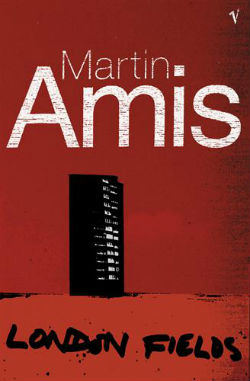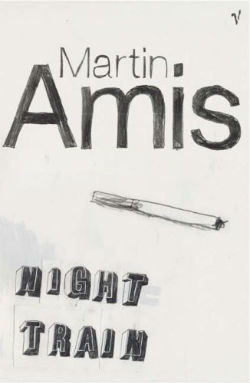
Martin Amis hails from distinguished literary stock, his father being Kingsley Amis (Lucky Jim), and his stepmother Elizabeth Jane Howard (The Cazalet Chronicle). A writer himself since the 1970s, he’s noted for The Rachel Papers (1973), Money (1984), and London Fields (1989). He won the James Tait Black Memorial Prize and was up for the Man Booker Prize twice. Acknowledged inspirations are Saul Bellow, James Joyce, and Vladimir Nabokov. Because his pedigree leans toward literature with a capitol L, I suspect many crime readers never give him a second look. But if they did, perhaps they’d appreciate that at the core of many a Martin Amis narrative is a mystery, noir-thumping heart.
 London Fields (1989)
London Fields (1989)
This tour-de-force opens with a bang, one of the most engaging starts to any of his novels.
This is the story of a murder. It hasn't happened yet. But it will. (It had better.) I know the murderer, I know the murderee. I know the time, I know the place. I know the motive (her motive) and I know the means. I know who will be the foil, the fool, the poor foal, also utterly destroyed. And I couldn't stop them, I don't think, even if I wanted to. The girl will die. It's what she always wanted. You can't stop people, once they start. You can't stop people, once they start creating.
The narrator is an author named Samson Young who has been suffering from writer’s block for years and is excited to have stumbled upon such a robust story to tell. The murderer could be the clueless cheat Keith Talent (who closes many a sentence with “innit?”) or the rich, gullible Guy Clinch who has fathered a monster child named Marmaduke who “gave no pleasure to anyone except when he was asleep.'' Both losers believe they are in control of Nicola Six, and all the while swirling around their cesspool are some of the most deliciously reprehensible characters to ever grace a literary novel—let alone a murder mystery. But all eyes are on the gorgeous murderee, Nicola Six, described as a black hole of sex. The way Amis depicts the sexual energy she emits is electrifying:
When Nicola walked the streets she was lit by her personal cinematographer, nothing too arty either, a single spotlight trained from the gods. She had a blue nimbus, the blue of sex or sadness. Any eyes that were available on the dead-end street would find their way to her: builders in the gutted houses, a frazzled rep in a cheap car, a man alone at home pressing his face against the window pane with a snarl.
Nicola is aware that she is going to be killed on her 35th birthday which is November 5, 1999, and we follow her in search of her assassin. A brutally hilarious satire that may surprise readers who are accustomed to the dour side of Mr. Amis—an author who’s always pictured with a scowl on his face in interviews and articles, as if when he smiled that granite facade would crack apart, and if that happened, I suspect we would find the clever jester that wrote many of these tragicomedy passages. By novel’s end, though, the pace quickens, wise cracks fall away, as a desperate Nicola sashays toward the precipice.
 Night Train (1997)
Night Train (1997)
Female police detective and recovering alcoholic Mike Hoolihan is tasked with probing the apparent suicide of her chief’s daughter, Jennifer. At first, it appears her boss simply can’t handle the fact that his daughter, who seemingly had everything going for her, would check out for no good reason. Mike, a modern day knight-errant á la Phillip Marlowe, observes:
Jennifer is there, wearing her toe-tag. That body. The scene photographs in the case folder, with the moist eyes and mouth, could almost be considered pornographic (arty and “tasteful” — kind of ecce femina), but there’s nothing erotic about her now, stiff like out of the deepfreeze, and flat on a slab between striplights and tiles. And all the wrong colors. The chemistry of death is busy with her, changing her from alkaline to acid.
Mike grills Trader Faulkner, Jennifer’s live-in boyfriend and number one suspect, as rigidly as she can but comes to the realization he’s innocent. Is it possible that, as forensics experts had concluded, Jennifer—an astrophysicist with everything—was a fatalist and simply offed herself?
It’s 3:25 before it hits me. Yesterday was Sunday. The night train must have been through hours ago. Hours ago, the night train came and went.
On the evening Jennifer Rockwell died, the sky was clear and the visibility excellent.
But the seeing—the seeing, the seeing—was no good at all.
Night Train is an amalgamation of the eloquent prose (all of Amis’s mentioned influences, primarily Nabokov, meld in Night Train)that one would expect from Amis and the gritty description demanded of a police procedural—let’s call it Literary Noir. On its release, Time magazine heralded, “Amis bombards, delights, [and] excites…. Night Train pushes the boundaries of noir almost to the edge of darkness.”
So, there you go, two modern literary classics to consider the next time you are reaching for a dog-eared copy of Raymond Chandler, Dashiell Hammett, or Agatha Christie, because just maybe you’d like a garden-fresh shot of crime in your life. Check out Martin Amis, an author with style to spare, labeled by the Philadelphia Inquirer as “slangy, showy, knowing, with pinball rhythms.”
Edward A. Grainger aka David Cranmer is the editor/publisher of the BEAT to a PULP webzine and books and the recent Western novella, Hell Town Shootout.
Read all of Edward A. Grainger's posts for Criminal Element.

Nicely written piece as always, David. And you make a good case. I’m a fan of a lot of Amis’s work and agree with you that readers of crime fiction should take a look at these two books, if they haven’t already.
Thanks, Brian. I know you agree that a good story is a good story regardless of genre. And it would be a shame for an aficionado of crime (and disciple of Elmore Leonard, Raymond Chandler, etc) to never read Amis.
Really fascinating stuff. Thanks for the introduction to Martin Amis.